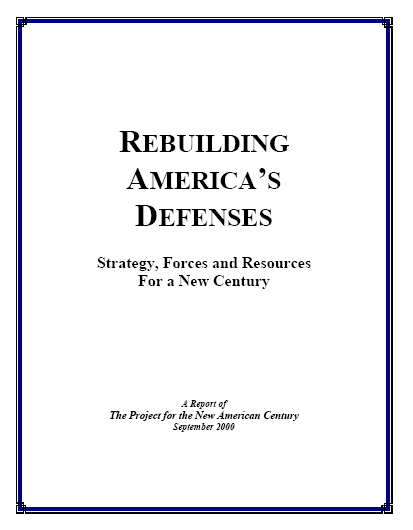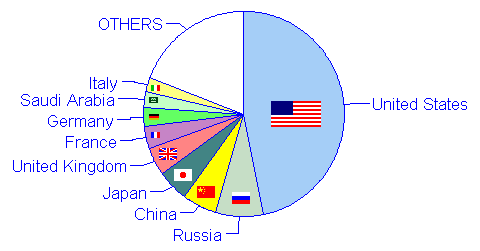

The greatest lie of the Bush administration is a lie of omission. During George Bush's 2000 presidential campaign he stated that he was against "nation-building", and he never gave any indication that he had any plans for military action involving the Middle East. Bush made several statements about national-building, including:
"Let me tell you what else I'm worried about: I'm worried about an opponent who uses nation building and the military in the same sentence. See, our view of the military is for our military to be properly prepared to fight and win war and, therefore, prevent war from happening in the first place."
"And so I don't think our troops ought to be used for what's called nation building."
The issue here is that the Bush "team", the future Bush administration, was already put together. It was a team of some of America's largest proponents of preemptive warfare and proponents of an invasion of Iraq in order to oust Saddam Hussein and impose US influence in the Persian Gulf. This is not just a case of saying one thing at election time and doing another once in office, this is a case of premeditated action. The Bush administration is a war cabinet that was put together with all of the most prominent advocates of war with Iraq. It is certainly not chance that George Bush just happened to select these people for his cabinet, and then we were attacked and evidence just "came to light" that Saddam was now a threat that had to be dealt with, however this is exactly how it was portrayed to the American people, and the world.
In 1992, shortly after Desert Storm, Dick Cheney, then the Secretary of Defense, began drafting a foreign policy plan that was geared towards American military global preeminence and American control of the Middle East.
In 1998 the Project for a New American Century wrote a letter to President Bill Clinton urging the removal of Saddam Hussein from power. That letter was signed by Donald Rumsfeld, Elliott Abrams, Richard L. Armitage, William J. Bennett, Jeffrey Bergner, John Bolton, Paula Dobriansky, Francis Fukuyama, Robert Kagan, Zalmay Khalilzad, William Kristol, Richard Perle, Peter W. Rodman, William Schneider, Jr., Vin Weber, Paul Wolfowitz, R. James Woolsey, and Robert B. Zoellick.
http://www.newamericancentury.org/iraqclintonletter.htm
10 of these 18 signers hold positions in the Bush cabinet today.
In 2000 The Project for a New American Century completed a draft, which they started in 1998, of their vision for the future of American foreign policy for the Bush administration.

http://www.newamericancentury.org/RebuildingAmericasDefenses.pdf
This plan for the Bush administration is a, “blueprint for maintaining global US pre-eminence, precluding the rise of a great power rival, and shaping the international security order in line with American principles and interests.”
This plan calls for American dominance in the Gulf region whether or not Saddam is in power, but admits that Saddam is a good excuse to take power, by stating:
The United States has for decades sought to play a more permanent role in Gulf regional security. While the unresolved conflict with Iraq provides the immediate justification, the need for a substantial American force presence in the Gulf transcends the issue of the regime of Saddam Hussein...
From an American perspective, the value of such bases would endure even should Saddam pass from the scene. Over the long term, Iran may well prove as large a threat to U.S. interests in the Gulf as Iraq has. And even should U.S.-Iranian relations improve, retaining forward-based forces in the region would still be an essential element in U.S. security strategy given the longstanding American interests in the region.
This plan sets fourth a clear goal for America to take control over all global resources possible and to maintain that control through military means and through the manipulation of local political forces. This plans states that purely American interests should be the primary consideration in all American foreign policy.
Today, that same security can only be acquired at the ‘retail’ level, by deterring or, when needed, by compelling regional foes to act in ways that protect American interests and principles...
America’s strategic goal used to be containment of the Soviet Union; today the task is to preserve an international security environment conducive to American interests and ideals...
American containment strategy did not proceed from the assumption that the Cold War would be a purely military struggle, in which the U.S. Army matched the Red Army tank for tank; rather, the United States would seek to deter the Soviets militarily while defeating them economically and ideologically over time...
...while adversaries like Iran, Iraq and North Korea are rushing to develop ballistic missiles and nuclear weapons as a deterrent to American intervention in regions they seek to dominate.
The plan clearly recognizes that weapons of mass destruction are strategic tools used by the countries now called the “Axis of Evil” to protect their own local interests from American intervention. What is important to note about this is that this is not how the situation is portrayed to the American public. Again, its not a matter of whether or not you agree with the policy in question, the issue is that this is the policy that is in use yet it is not the policy that the Bush cabinet claims is in use. The motivation for war that was given to the public by the Bush administration centered on protecting Americans from direct harm. What this policy states is that military intervention in Iraq is needed not to protect the lives of American from direct harm, but to prevent regional powers from developing military means that allow them to control the economic and political climates in their own regions.
This plan, which was developed for the Bush administration, claims that today, while America has possibly the most powerful military advantage of any country in the history of the world over its “adversaries” and that while America currently spends more money on its military than the next top 20 military spenders in the world combined (most of which are our allies), the American military is still woefully under funded.
Relative Military Spending by the nations of the world, ca. 2003:

http://users.erols.com/mwhite28/usaworld.htm
This plan goes on to state that the goal of the American military should be to "fight and decisively win multiple, simultaneous major theater wars." This means that the goal of the American military should be that of being able to wage global war all by itself.
Wolfowitz and Libby, two members of the Bush cabinet, have drafted plans that state that the US must, “discourage advanced industrial nations from challenging our leadership or even aspiring to a larger regional or global role.”
It cannot be any more plain that their vision of US strategy for the 21st century should be global domination, not that of a global partner, but that of a global dictator.
In addition, the Statement of Principles for the PNAC is endorsed by Jeb Bush, Steve Forbes, Elliott Abrams, Gary Bauer, William J. Bennett, Dick Cheney, Eliot A. Cohen, Midge Decter, Paula Dobriansky, Aaron Friedberg, Francis Fukuyama, Frank Gaffney, Fred C. Ikle, Donald Kagan, Zalmay Khalilzad, I. Lewis Libby, Norman Podhoretz, Dan Quayle, Peter W. Rodman, Stephen P. Rosen, Henry S. Rowen, Donald Rumsfeld, Vin Weber, George Weigel, and Paul Wolfowitz.
http://www.newamericancentury.org/statementofprinciples.htm
Read those names carefully, you will be seeing them again.
Even if you agree with the plans of the PNAC what you do have to recognize is that the current Bush administration is a war cabinet. The Bush administration was put together prior to 9/11/2001. At the very least what can be said is that George W. Bush Jr. had the intentions of going to war with Iraq during his presidential campaign. Given this fact it is important to note that he did not campaign on this fact, and in fact he campaigned against nation building.
This is where the lie comes in. He committed a lie to the American people of the gravest magnitude. It was a tremendous lie of omission. The American people that did vote for Bush (and that is another topic of debate of course) didn’t vote for him on the premise that he was going to jump into office and wage war on Iraq and work to further global American military and economic dominance. If he had told America the truth about this plan to wage war on Iraq from the beginning it is doubtful that he would have even been close to being elected. Instead he and his affiliates lied and kept the plan quite until after he was in office.
Not only that, but even since the issue of war with Iraq has come up the administration has still never publicly discussed this agenda, they simply make claims about weapons of mass destruction, terrorism, patriotism, God, and the liberation of Iraq. These comments were never satisfactorily supported prior to entering into war with Iraq.
These facts make it clear that there was a plan to go to war with Iraq regardless of what happened on September 11th 2001. George Bush and Dick Cheney were dishonest from the very start about the most serious subject in the world, war. Whether you agree with the war or not there is no way to deny that fact.
Update 1/8/2004: An End To Evil by David Frum and Richard Pearl
| Previous | Next | Contents |
|
| ||||||||||||||||